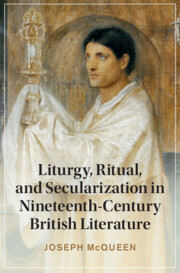
-
Select format
-
- Publisher:
- Cambridge University Press
- Publication date:
- November 2024
- November 2024
- ISBN:
- 9781009435932
- 9781009435956
- Dimensions:
- (229 x 152 mm)
- Weight & Pages:
- 0.51kg, 262 Pages
- Dimensions:
- Weight & Pages:
You may already have access via personal or institutional login
Book description
Simultaneously spiritual and material, liturgy incarnates unseen realities in concrete forms – bread, wine, water, the architectural arrangement of churches and temples. Nineteenth-century writers were fascinated with liturgy. In this book Joseph McQueen shows the ways in which Romantic and Victorian writers, from Wordsworth to Wilde, regardless of their own personal beliefs, made use of the power of the liturgy in their work. In modernity, according to recent theories of secularization, the natural opposes the supernatural, reason (or science) opposes faith, and the material opposes the spiritual. Yet many nineteenth-century writers are manifestly fascinated by how liturgy and ritual undo these typically modern divides in order to reinvest material reality with spiritual meaning, reimagine the human as malleable rather than mechanical, and enflesh otherwise abstract ethical commitments. McQueen upends the dominant view of this period as one of scepticism and secularisation, paving the way for surprising new avenues of research.
Reviews
‘Highly recommended.’
L. A. Brewer Source: Choice
Contents
Metrics
Full text views
Full text views help Loading metrics...
Loading metrics...
* Views captured on Cambridge Core between #date#. This data will be updated every 24 hours.
Usage data cannot currently be displayed.
Accessibility standard: Unknown
Why this information is here
This section outlines the accessibility features of this content - including support for screen readers, full keyboard navigation and high-contrast display options. This may not be relevant for you.
Accessibility Information
Accessibility compliance for the PDF of this book is currently unknown and may be updated in the future.


